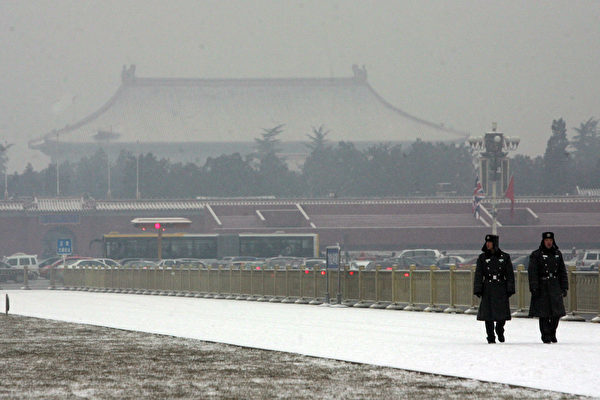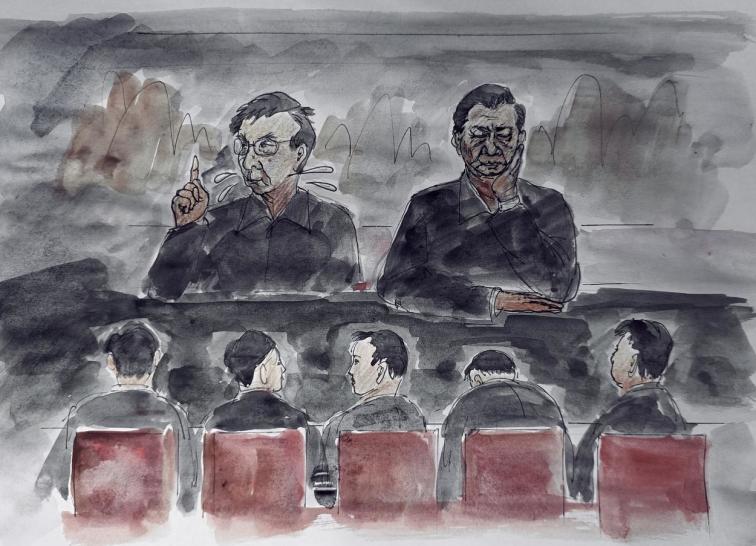Dark clouds hang over Tiananmen Square in Beijing. (Lintao Zhang/Getty Images)
[People News] According to Chinese state media, on the morning of August 26, Xi Jinping and Peng Liyuan met with Cambodian King Norodom Sihamoni and Queen Mother Monineath at Zhongnanhai. From the modest furnishings shown in the photos and videos released, the meeting most likely took place in Chunyi Zhai, near Fengze Garden. Notably, when Xi met Belarusian President Lukashenko in June this year, it was also at Chunyi Zhai. This is the first oddity.
It is well known that Zhongnanhai is the headquarters of the CCP Central Committee and the State Council. During the Mao and Deng eras, the Ziguang Pavilion at Zhongnanhai was the reception hall for foreign dignitaries. But from Deng’s successors (Jiang, Hu, and Xi), foreign leaders have generally been received at the Great Hall of the People or Diaoyutai State Guesthouse, with Zhongnanhai used only occasionally for informal or intimate meetings — reserved for very few, such as Russian President Putin.
On May 16, 2024, Xi held a small meeting with Putin at Yingtai inside Zhongnanhai. Back in November 2014, Xi invited then U.S. President Obama to stroll and dine with him at Yingtai Island. When Obama asked Xi where he worked, Xi pointed to the building behind him. In other words, Xi’s office and his foreign receptions were centred on Yingtai. Fengze Garden, by contrast, has a traditional opera stage and is essentially an entertainment venue, sometimes used for meetings but not a place of protocol.
King Sihamoni and his 88-year-old mother Monineath were in Beijing for their routine medical checkup — a practice that has continued for years. Sometimes they travel to China more than once a year for rest and recuperation; they even maintain a palace residence in Beijing. On every such visit, CCP leaders, including Xi, meet them. Xi previously met them in 2023, 2020, and 2017 at Zhongnanhai.
From past official photos and videos, between 2017 and 2023, Xi received them either at Diaoyutai’s Yangyuan Hall, the Great Hall of the People, or higher-status, more elegant spaces inside Zhongnanhai. Now, Xi only met them at Chunyi Zhai — a venue of far lower prestige, almost a slight. The choice of such a setting may not have been Xi’s decision.
Does this mean Xi has already moved out of Yingtai? Or that his movements are somehow restricted? The implications are self-evident.
The second oddity lies in Xi’s remarks. Apart from expressing welcome and mentioning his April visit to Cambodia, he only gave generic statements about bilateral relations, such as supporting Cambodia’s “pursuit of a development path suited to its national conditions.”
Compared with previous years, the difference is striking.
In 2023, Xi said, “No matter how the international situation changes, China-Cambodia friendship remains evergreen. Our relationship has become a model of international relations. The King and Queen Mother are witnesses and participants in China’s reform and development, long caring for China’s progress, and are good friends of the Chinese people.” He added that China and Cambodia would carry forward their “ironclad” friendship, build a “diamond hexagon” cooperation framework, support Cambodia’s “industrial development corridor” and “rice and fish corridor,” and continue to back the King’s Working Group for the Cambodian people’s benefit.
In 2020, Xi stressed his “deep friendship with the King and Queen Mother,” praised their visit to Yan’an as “a journey to inherit friendship and deepen ties,” and even awarded Queen Mother Monineath the “Friendship Medal” for her contributions.
In 2017, Xi emphasised the history of Sino-Cambodian friendship, saying: “The two countries have deep political trust, mutually beneficial economic cooperation, mutual support in national development, and close coordination on international and regional affairs.” He encouraged frequent high-level exchanges “just like visiting relatives,” strategic alignment, and major project cooperation.
Clearly, in these earlier meetings, Xi spoke like a leader in full command. This year’s remarks could have been delivered by any senior official, lacking the authority of a supreme leader.
The third oddity lies in the Cambodian side’s statements. This year, they merely thanked Xi for the invitation, mentioned his April visit, and spoke of building an “all-weather community of shared destiny” with China.
In 2023, they first thanked Xi and Peng for their “thoughtful arrangements and care” during their medical stay, then praised China’s selfless assistance, endorsed the Belt and Road Initiative, and commended Xi’s concept of a shared future for mankind.
In 2020, Sihamoni thanked Xi and Peng for their “grand reception, which made us feel the deep friendship of the Chinese people.” He said their visit to Yan’an let them experience Xi’s “people-centred thinking” and pledged to “write a new chapter of friendship.” He even wished China “greater achievements under Xi’s leadership.”
In 2017, they thanked China for its support to the Cambodian monarchy, emphasised “deep-rooted and enduring” friendship, and expressed gratitude — though at that time, before Xi had established himself as the “one and only leader,” Peng Liyuan’s name was mentioned only at the end of reports, and the Cambodian royals’ tone was notably less effusive.
From 2017 through 2023, state media reports always highlighted the Cambodian royals’ personal gratitude toward Xi and Peng. But in this year’s coverage, such expressions are missing. Does that not speak volumes?
If Xi truly still held absolute power, would these oddities exist?
(First published by People News)










News magazine bootstrap themes!
I like this themes, fast loading and look profesional
Thank you Carlos!
You're welcome!
Please support me with give positive rating!
Yes Sure!